I overheard my parents talking about spearmint tea a lot when I was growing up. Little did I know, there are various health benefits that spearmint can provide us. I instantly fell in love with the earthy, minty flavor the first time I drank the tea and never stopped ever since.
If you’re a passionate herbal tea drinker like me, you’re probably wondering how spearmint is good for your health. Well, I’ve done some research on the herb and would like to share what I discovered about spearmint’s potential medicinal benefits.
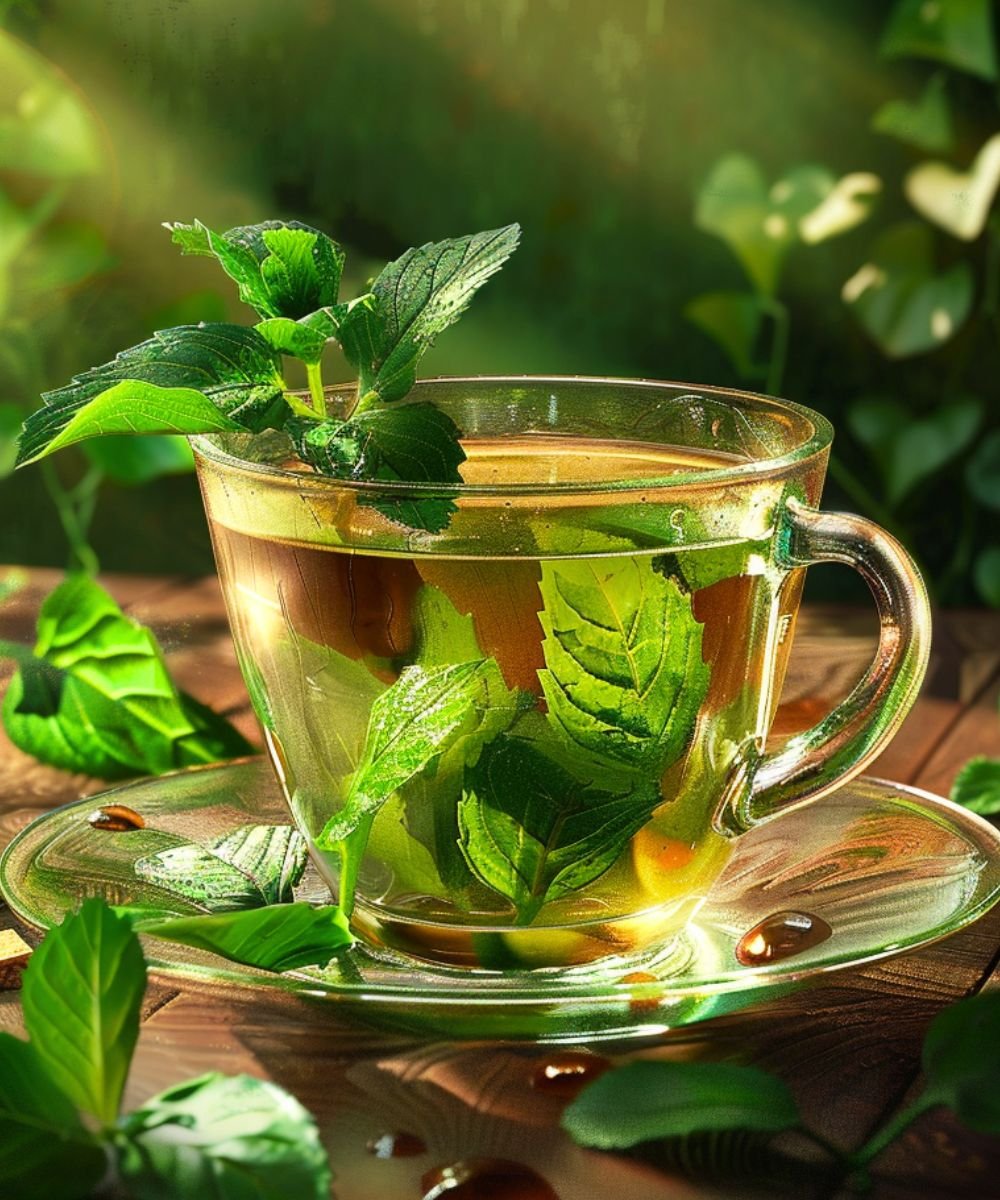
What Is Spearmint Tea?
Spearmint herbal tea is tea brewed from fresh or dried leaves the Mentha spicata, a type of mint similar to peppermint. This aromatic herb of the mint family (Lamiaceae) got its name because of its green spear-shaped leaves.
Spearmint is also used to flavor many other products including chewing gum, candy, toothpaste, and mouthwash.
Spearmint Active Compounds
Spearmint contains many beneficial compounds including the active component carvone (a terpenoid) which has antibacterial and antifungal properties.
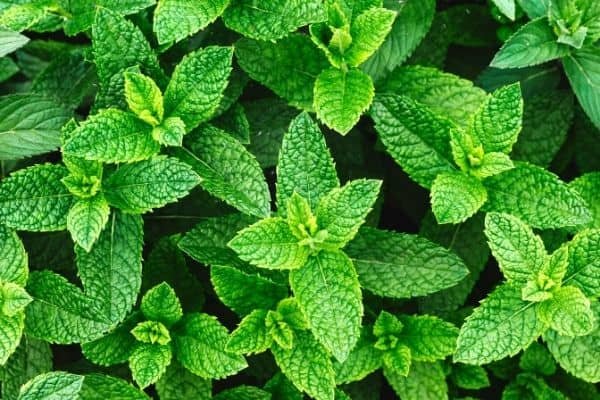
Other important active compounds are limonene, dihydrocarvone, and 1,8-cineole. The plant is also packed with beneficial vitamins and nutrients.
History of Medicinal Use
Spearmint is a native plant of Europe and Asia but now grows almost everywhere around the world. The plant has long been used in ancient medicine for digestive complaints.
In Traditional Arabic Palestinian Herbal Medicine (TAPHM), essential oils of fresh and dried spearmint have been used to treat the following conditions:
- Digestive disorders
- Abdominal pain
- Muscle spasm
- Gas/flatulence
- Obesity
- Headache and toothache
- Fever, sore throat, cough, and cold
- High blood pressure
- Menstrual pain
- Depression
- Dementia and cognitive decline
People still use spearmint tea, spearmint essential oil, and other herbal infusions for these ailments today and many of its benefits have now been backed up by research.
Taste and Aroma of Spearmint Tea
Spearmint is a pleasant-smelling plant with a delicate, sweet, minty taste.
The active ingredient carvone is mainly responsible for spearmint’s flavor, which is less pronounced than the menthol in peppermint. You’ll still notice a subtle cooling sensation as you sip the tea.
TIP: If you like your tea sweet, check out our guide about how to sweeten tea without sugar.
Spearmint Tea Benefits
This fragrant herb does not only taste good, but it may also benefit your health. In fact, many people swear by spearmint as an alternative remedy for digestive problems and other health issues.
1. Can Aid Digestion
The antispasmodic abilities of mentha spicata may help relieve symptoms of digestive complaints by relaxing your stomach muscles. This same action in the digestive tract may explain why spearmint helps relieve nausea and vomiting.
A supplement containing spearmint and other herbs was found to relieve symptoms of irritable bowel syndrome (IBS) in patients who participated in a clinical trial. Patients reported significant improvement in bloating and abdominal pain compared to participants who were given a placebo.
Applying spearmint essential oil on the skin may also be a promising natural therapy for nausea and vomiting brought on by chemotherapy.
2. May Help with Polycystic Ovary Syndrome (PCOS)
Polycystic ovary syndrome (PCOS) is a hormonal disorder that affects 1 in 10 women of reproductive age. PCOS stems from hormonal imbalances that cause irregular or prolonged menstrual periods. Women with PCOS have higher than normal levels of androgen (testosterone), a male hormone, which causes them to have trouble getting pregnant.
Birth control pills and progestin therapy are two common treatments for PCOS, but they both cause unwanted side effects. However, Mentha spicata can be an effective natural way to treat PCOS.
In a 30-day study, 42 women with PCOS were given spearmint herbal tea daily. The herbal infusion was found to have enough anti-androgen effect to lower the level of testosterone linked to infertility in women with PCOS. The ability of spearmint tea to lower testosterone levels in women was already confirmed in an earlier study and may help increase their chances of getting pregnant.
3. Can Reduce Acne
Acne is caused mainly by oil and bacteria trapped under the skin. Other causes include hormonal imbalances due to excess of the male hormone known as androgen. Common acne treatments include antibiotics and topical medications such as benzoyl peroxide and salicylic acid.
Studies indicate that spearmint tea may be a natural remedy for acne since it has the ability to lower the level of the male hormone. Additionally, spearmint has antibacterial and antimicrobial agents that can kill bacteria under the skin that causes acne.
4. Rich in Antioxidants
Regularly drinking freshly brewed spearmint tea helps boost antioxidant levels in your body. Antioxidants are substances that remove free radicals in the body that can make you sick.
Spearmint is found to have “good total phenolic and flavonoid contents” and “exhibited excellent antioxidant activity,” according to a report published in the journal of Food Chemistry.
The main active antioxidant in spearmint is limonene but it also contains some rosmarinic acid. The antioxidants in the plant showed a high level of scavenging abilities, which is needed to fight oxidative stress in the body that causes inflammation and damages healthy cells.
Oxidative stress is an underlying cause of many common diseases and conditions including diabetes, cancer, inflammatory disorders, poor immunity, Alzheimer’s, and memory loss due to cognitive decline.
5. May Improve Cognition and Memory
When I first tried spearmint tea decades ago, I had no idea that drinking it frequently could help my brain function better and preserve my memory. Apparently, it does, and there is evidence from scientific research to prove it.
One in vitro study concluded that the rosmarinic acid in spearmint extract improved learning and memory.
Spearmint extract also improved working memory in men and women affected by age-associated memory impairment (AAMI). The participants who received 900 mg of spearmint supplement daily for a length of time reported they slept better and were more alert when awake. The researchers concluded that spearmint may be a beneficial nutritional remedy for improving cognitive health in senior adults with AAMI.
6. Reduces Stress
I find a cup of spearmint tea to be quite relieving after a long and stressful day. You should try it too!
The plant leaves contain menthol, a compound known to sedate and relax the mind and body. Spearmint is thought to relieve stress by acting on a neurotransmitter in the brain known as gamma-Aminobutyric acid (GABA). By affecting GABA, M. spicata may decrease activity in your nervous system and relieve anxiety and insomnia related to stress.
As such, the plant could be useful as a natural alternative to medications used to aid sleep, reduce anxiety, and improve mood.
How to Make Spearmint Tea
Brewing yourself a cup of delightful spearmint tea is quick and easy. Just follow these simple steps!
Here is how to prepare 2 cups of spearmint tea:
- Boil two cups (470 ml) of water.
- Remove from heat and add about 10-20 fresh or dried spearmint leaves depending on how strong you like your tea.
- Cover and let steep for 5-10 minutes.
- Strain and enjoy! You can add some honey or sugar and lemon to taste if desired.
Or why not make it into an iced tea?
During a hot summer day, a glass of iced spearmint tea with a bit of lemon and honey is one of the most refreshing beverages I can think of.
Use one of our recommended iced tea makers to conveniently prepare your drink!
Where to Buy Spearmint Tea
You might already have some freshly picked or dried spearmint leaves. If not, I warmly recommend Buddha Teas Organic Spearmint Leaf Tea. For more options, you can take a look at this guide with my favorite mint tea products.
Or if you don’t want to order your tea online, fresh and dried spearmint leaves are also widely available at groceries, farmer’s markets, and herbal stores. The only problem is that the selection is often quite limited.
Grow It at Home
It is also easy to grow your own spearmint. You can use a hydroponic garden kit to make things more convenient or set up a vertical garden to save some space.
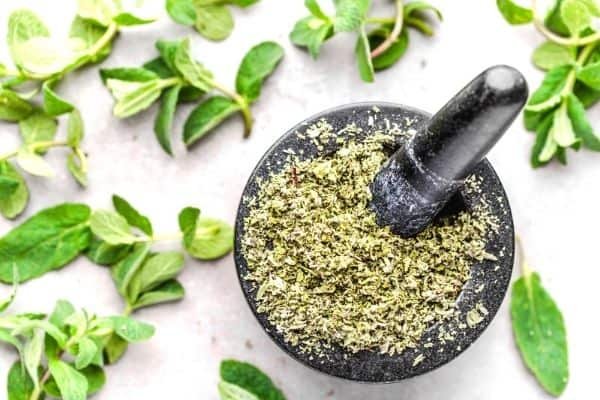
After harvesting a larger amount of spearmint you might also want to use a dehydrator so you can store it longer. Finally, keep the dried leaves in an airtight tea container to retain their flavor and aroma.
Spearmint Tea Side Effects
Spearmint is widely used as a culinary herb and is generally known to be safe for humans to consume. It is free of caffeine, so you don’t have to worry about any adverse effects like jitters or sleeping problems.
If you are pregnant or breastfeeding it is not recommended to consume peppermint tea because it can affect female hormonal balance. Also, if you have severe liver or kidney damage or some other medical condition, you should speak with your doctor or healthcare professional before starting an herbal treatment regimen using Mentha spicata.
Spear Me Some Mint Tea!
I love spearmint tea for 2 reasons: it’s delicious and healthy. The research and centuries of traditional medicinal use have shown that spearmint has the ability to relieve certain conditions. Just remember it may require weeks of consistently drinking several daily doses of this herbal tea to get the desired benefits you’re hoping for.
As described earlier, making a cup of tasty spearmint tea is easy. If you want to try something a bit different, check out this recipe for traditional Moroccan mint tea.
Enjoy your Refreshing Spearmint Tea!
-Joonas
Save on Pinterest:
|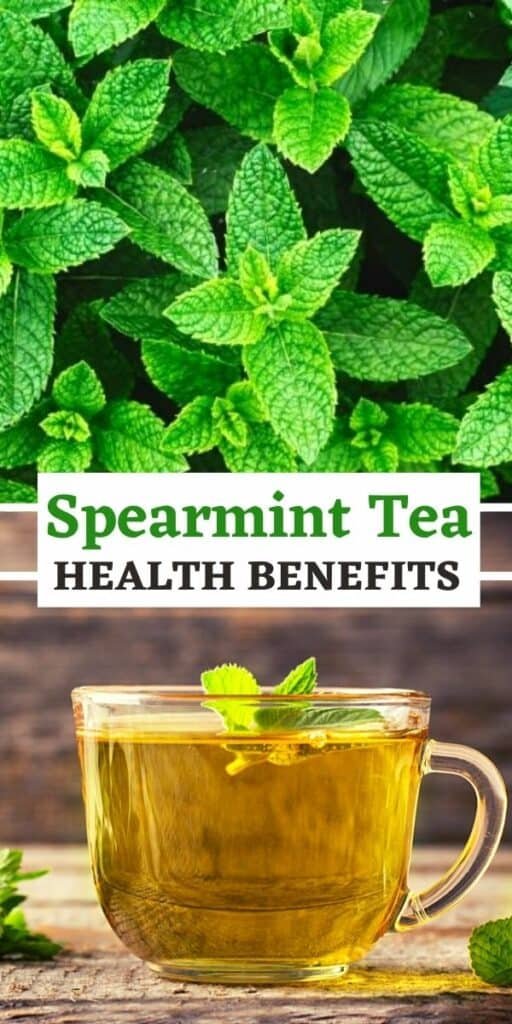

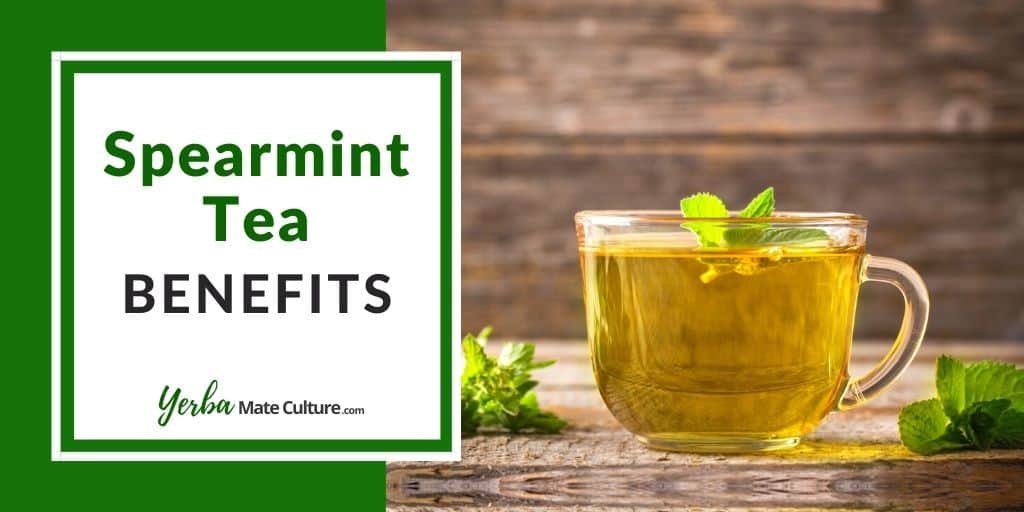


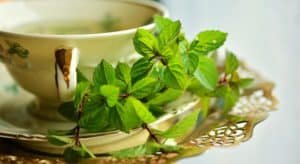

I am drinking it right now! Thank you for the information it has me thinking positive! ❤️
Hi Natalie,
Nice to hear that you found my article informative. Enjoy your spearmint tea!
-Joonas